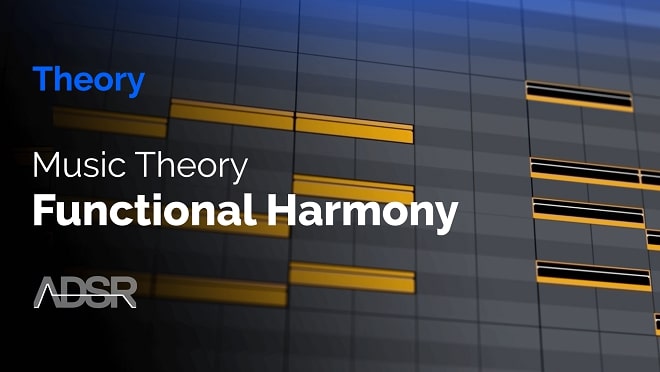
ADSR Sounds Music Theory & Functional Harmony TUTORIAL
Size 294 Mb
Music Theory & Functional Harmony
When learning about Music Theory most people start with scales, modes and chords and then sort of.. stop. This makes you miss out on of the most exciting parts of Theory: Form.
In this course we’re going to check out not only those all important scales and chords, but also Functional Harmony, which is a system that categorises Chords into their unique “functions”.
This will allow you to build chord progressions that evoke specific emotions, creating a story in which you’re the writer, you can steer the story into any direction depending on the mood you want to create: in whatever type of music you produce!
Learn How To Transport Your Listeners With Intensely Emotional Chords & Harmonies
Music Theory & Functional Harmony Course Summary
This course will focus on Functional Harmony, which is a system that categorises Chords into their unique “functions”. This allows you to build chord progressions that evoke specific emotions, it creates a story in which you’re the writer, you can steer the story into any direction depending on the mood you want to create.
If you struggle with getting the perfect feel to your tracks, and want to master that ultimate emotional sensation for your music – be sure to check this course out.
Course Features
- Over 2 hours of practical, professional video instruction
- Led by a respected, talented and knowledgeable producer
- 11 focused tutorial videos providing useable production techniques and creative tips for all music producers
- In just 2 hours you will be able to understand music and harmony on a completely new level, guaranteed!
- Learn at your own pace, watch as many times as you need to learn the lessons
Scales & Intervals, Sharps & Flats
► Major & Minor Scales
In this video we look at how major and minor scales work and how you can find them, along with intervals.
- Explanation of steps and scales
- Learn about major & minor scales
- Learn about intervals & how to apply them
► Sharps & Flats
We’ll learn the difference between sharp and flat notes, along with an introduction to playing scales.
- Introduction to playing scales
- When to use sharps and flats
- Learn to create contrasting note progressions
Basic & Advanced Chord Creation
► Basic Chords
In this section we’ll learn the skills you need to create basic chords, both major and minor triads plus find out about arpeggios.
- Applying rules to build chords
- Using thirds and fifths
- What is an arpeggio?
► Diminished & 7th Chords
Here we move on to finishing the foundation section of this course: writing more advanced chord creation such as diminished and 7th’s.
- Learn how to harmonize scales
- Using major, major & dominant 7ths
Chord Functions Introduced
► Learn how to use your new skills
Jor explains how to get some impressive results from the musical language we’ve learnt so far to expand your creativity and make some amazing chord progressions as he introduces Functional Harmony theory.
Everything that you’ve learnt so far will start to come together, allowing you to master creating your own tricky, intricate chord sequences from scratch.
- Learn how to use Functional Harmony
- Tonic, pre-dominant and dominant functions
- Creating extreme tension in your progressions
The different functions explained
► Tonic Function
Here we’ll learn how to use the Tonic Function to create stability in our musical landscape.
- Define where your music is going
- Learn about prolongation
- Bring about a feeling of conclusion
► The Dominant Function
Learn how to use the Dominant Function to create a tense feeling in your chord progressions, and when to use this technique for maximum impact.
- Create tension
- Chord selection
- Resolving your progression
More chord functions explained
► The Pre-Dominant Function
In this section teaches us about the predominant, or sub dominant function, the most versatile of the function we’ll learn about in this course. You’ll learn how to move between Tonic and Dominant functions to finish your progressions with complete artistry.
- When to use the Pre-Dominant function
- How to use ‘weird’ chords & inversions
- Learn to modulate to different scales?
► Examples
This course includes two videos detailing examples of how to use the techniques that you’ve used, helping you to write the chord progressions of your dreams!
- Create impressive chord sequences
- Master Functional Harmony
